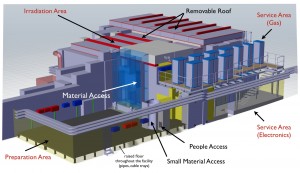Good news for detector developers in Europe: the AIDA-2020 proposal to the European Commission has been selected to be funded as part of the Horizon 2020 programme. This means that future projects needing state-of-the-art particle detectors like the Large Hadron Collider upgrade and the linear collider will receive a total of ten million euros funding over the next four years. Thirty-eight participants from all across Europe take part in AIDA2020, including CERN as coordinating institute, making it the largest European detector R&D project.
AIDA 2020 follows in the footsteps of previous EU-funded detector development projects like EUDET or AIDA. But whereas EUDET was solely for linear-collider detectors, and the first AIDA already had LHC and neutrino detector R&D on board, the new AIDA structure repackages all these different projects for more overlap and stronger ties between researchers and their expertise.
The project will concentrate on so-called horizontal activities, i.e. areas that every detector needs such as microelectronics and software development, as well as more specific areas like gaseous detector, silicon detectors or calorimetry. Most detectors for particle colliders share the same basic setup, with concentric layers of trackers, calorimeters, muon detectors and a strong magnet, and although the requirements vary between future detectors at the LHC and at the linear collider, the fundamental technologies are the same. Common working groups spanning all projects working on the overall technology are supposed to increase efficiency, encourage cooperation and even provide some cross-fertilisation.
Like its predecessor, AIDA-2020 puts emphasis on common infrastructures like test beams at various labs and irradiation facilities and supports upgrades of their instrumentation as well as the access of the international user community. And as encouraged by the European Commission, innovation and outreach receive a stronger boost as well.
The preparation team hopes that this will be a boost for the future of particle physics in Europe and something they can build on for the future… After all AIDA-2020 received 14.5 out of 15 marks for excellence, impact and implementation. The project will officially start some time in May with a kick-off meeting.
Horizon 2020 is the biggest European Research and Innovation programme ever with nearly €80 billion of funding available over seven years between 2014 and 2020. Horizon 2020 puts strong emphasis on the coupling of research and innovation, thus “helping to achieve securing Europe’s global competitiveness with its emphasis on excellent science, industrial leadership and tackling societal challenges. The goal is to ensure Europe produces world-class science, removes barriers to innovation and makes it easier for the public and private sectors to work together in delivering innovation.”



I cannot be impressed with a commitment of 10 million euros.